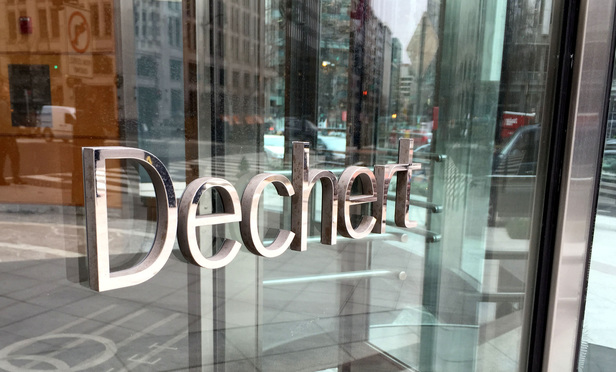Dechert chief cites London growth as key factor as revenue and PEP inch upwards
US firm posts 2.4% 2016 revenue rise to $911.5m
January 30, 2017 at 04:39 AM
4 minute read
The original version of this story was published on Law.com
Dechert has posted a 2.4% increase in revenue and a 1.6% increase in profits per equity partner (PEP) for 2016.
Gross revenue for the year was $911.5m (£724m), up from $890m (£707m) in 2015. Net income was down 2.2%, at $400.5m (£318m), and revenue per lawyer was down 1% to $995,000 (£791,000). Equity partner profits saw a very modest bump, with PEP rising to $2.55m (£2.03m) from $2.51m (£1.99m) in 2015.
CEO Henry Nassau said the firm was on solid ground despite a 2016 that came with revenue challenges and geopolitical surprises. The UK's vote to leave the European Union and the US presidential election marked a "populist sweep", he said, adding: "I was worried about whether that was going to interfere with being a global business."
Even with Brexit, however, he said Dechert's London office grew the most.
Dechert's internal investigations practice experienced a "huge uptick" thanks to a particular client, Nassau said, and the funds practice was "a pleasant surprise", growing by $29m (£23m). Intellectual property had a good year as well, he said, and real estate securitisation, while quiet in the middle of the year, was strong otherwise.
Litigation was soft, Nassau said, as the firm wrapped up its work on behalf of air bag manufacturer Takata, which had encountered civil cases, criminal inquiries and regulatory issues. Getting the Takata work was a surprise for the firm and caused a 17% boost in the firm's 2015 litigation revenue, he said.
The US was relatively flat overall, Nassau said, and the firm's greatest growth was in London, followed by Paris. While the long-term implications of Brexit remain unknown, he said, the London office will be busy in the near term. The London office made a significant addition in late 2016, he noted, with the hire of a global finance team.
Currency fluctuations had an $8m (£6.4m) negative impact on revenue in 2016, he said.
Overall demand was flat for Dechert, in line with the industry trend, as the firm's total hours billed were down 0.7% in 2016, from 2015. Hourly rates increased by 3%-5%.
The firm's equity partnership ranks shrank slightly, with 157 equity partners in 2016, down from 163 in 2015. Nassau said there were a number of retirements, but they were mostly balanced out by lateral hires. In the fourth quarter alone, the firm added a dozen lateral partners.
The non-equity partner tier grew by 10.7%, from 122 in 2015 to 135 in 2016. Average compensation for all partners was $1.66m (£1.3m), a 2% decrease from nearly $1.7m (£1.35m) in 2015.
The firm's total lawyer headcount grew from 884 in 2015 to 916 in 2016.
One expense that grew unexpectedly in 2016 was associate salaries. Dechert raised its starting salary for associates to $180,000 (£143,000) over the summer, matching increases first announced by Cravath Swaine and Moore. The raises affected only the second half of the year and had an impact of $5m-$6m (£4m-£4.8m), Nassau said.
Nassau said Dechert prepaid about $5m (£4m) in expenses for 2017, to "let people know we were still breathing and functioning". A year ago, it prepaid about $2.5m (£2m) of its 2016 expenses, he said.
To maintain profitability, Dechert will have to grow revenue by at least 5% in 2017, Nassau said. The firm has a path toward that goal, he said, as long as demand remains. Nassau predicted the firm would grow significantly outside the US in 2017. That includes growth plans in Asia, even though some firms are closing there.
"If you have a global footprint, you have a global footprint," he said.
He said Shanghai is likely the next market Dechert will enter, but the firm is in no rush. Nassau said he expects the firm will continue headcount growth overall, particularly in New York and Washington DC.
This content has been archived. It is available through our partners, LexisNexis® and Bloomberg Law.
To view this content, please continue to their sites.
Not a Lexis Subscriber?
Subscribe Now
Not a Bloomberg Law Subscriber?
Subscribe Now
NOT FOR REPRINT
© 2025 ALM Global, LLC, All Rights Reserved. Request academic re-use from www.copyright.com. All other uses, submit a request to [email protected]. For more information visit Asset & Logo Licensing.
You Might Like
View All
KWM Adds Three New Partners in Singapore and Australia

Whistleblowing in 2025: What's on the Horizon for GCs?

Quartet Of Firms Secure Roles as LG Group’s IT Services Arm Lists for $823M
Trending Stories
Who Got The Work
J. Brugh Lower of Gibbons has entered an appearance for industrial equipment supplier Devco Corporation in a pending trademark infringement lawsuit. The suit, accusing the defendant of selling knock-off Graco products, was filed Dec. 18 in New Jersey District Court by Rivkin Radler on behalf of Graco Inc. and Graco Minnesota. The case, assigned to U.S. District Judge Zahid N. Quraishi, is 3:24-cv-11294, Graco Inc. et al v. Devco Corporation.
Who Got The Work
Rebecca Maller-Stein and Kent A. Yalowitz of Arnold & Porter Kaye Scholer have entered their appearances for Hanaco Venture Capital and its executives, Lior Prosor and David Frankel, in a pending securities lawsuit. The action, filed on Dec. 24 in New York Southern District Court by Zell, Aron & Co. on behalf of Goldeneye Advisors, accuses the defendants of negligently and fraudulently managing the plaintiff's $1 million investment. The case, assigned to U.S. District Judge Vernon S. Broderick, is 1:24-cv-09918, Goldeneye Advisors, LLC v. Hanaco Venture Capital, Ltd. et al.
Who Got The Work
Attorneys from A&O Shearman has stepped in as defense counsel for Toronto-Dominion Bank and other defendants in a pending securities class action. The suit, filed Dec. 11 in New York Southern District Court by Bleichmar Fonti & Auld, accuses the defendants of concealing the bank's 'pervasive' deficiencies in regards to its compliance with the Bank Secrecy Act and the quality of its anti-money laundering controls. The case, assigned to U.S. District Judge Arun Subramanian, is 1:24-cv-09445, Gonzalez v. The Toronto-Dominion Bank et al.
Who Got The Work
Crown Castle International, a Pennsylvania company providing shared communications infrastructure, has turned to Luke D. Wolf of Gordon Rees Scully Mansukhani to fend off a pending breach-of-contract lawsuit. The court action, filed Nov. 25 in Michigan Eastern District Court by Hooper Hathaway PC on behalf of The Town Residences LLC, accuses Crown Castle of failing to transfer approximately $30,000 in utility payments from T-Mobile in breach of a roof-top lease and assignment agreement. The case, assigned to U.S. District Judge Susan K. Declercq, is 2:24-cv-13131, The Town Residences LLC v. T-Mobile US, Inc. et al.
Who Got The Work
Wilfred P. Coronato and Daniel M. Schwartz of McCarter & English have stepped in as defense counsel to Electrolux Home Products Inc. in a pending product liability lawsuit. The court action, filed Nov. 26 in New York Eastern District Court by Poulos Lopiccolo PC and Nagel Rice LLP on behalf of David Stern, alleges that the defendant's refrigerators’ drawers and shelving repeatedly break and fall apart within months after purchase. The case, assigned to U.S. District Judge Joan M. Azrack, is 2:24-cv-08204, Stern v. Electrolux Home Products, Inc.
Featured Firms
Law Offices of Gary Martin Hays & Associates, P.C.
(470) 294-1674
Law Offices of Mark E. Salomone
(857) 444-6468
Smith & Hassler
(713) 739-1250










